Sierra Leone
Strengthening human rights reporting
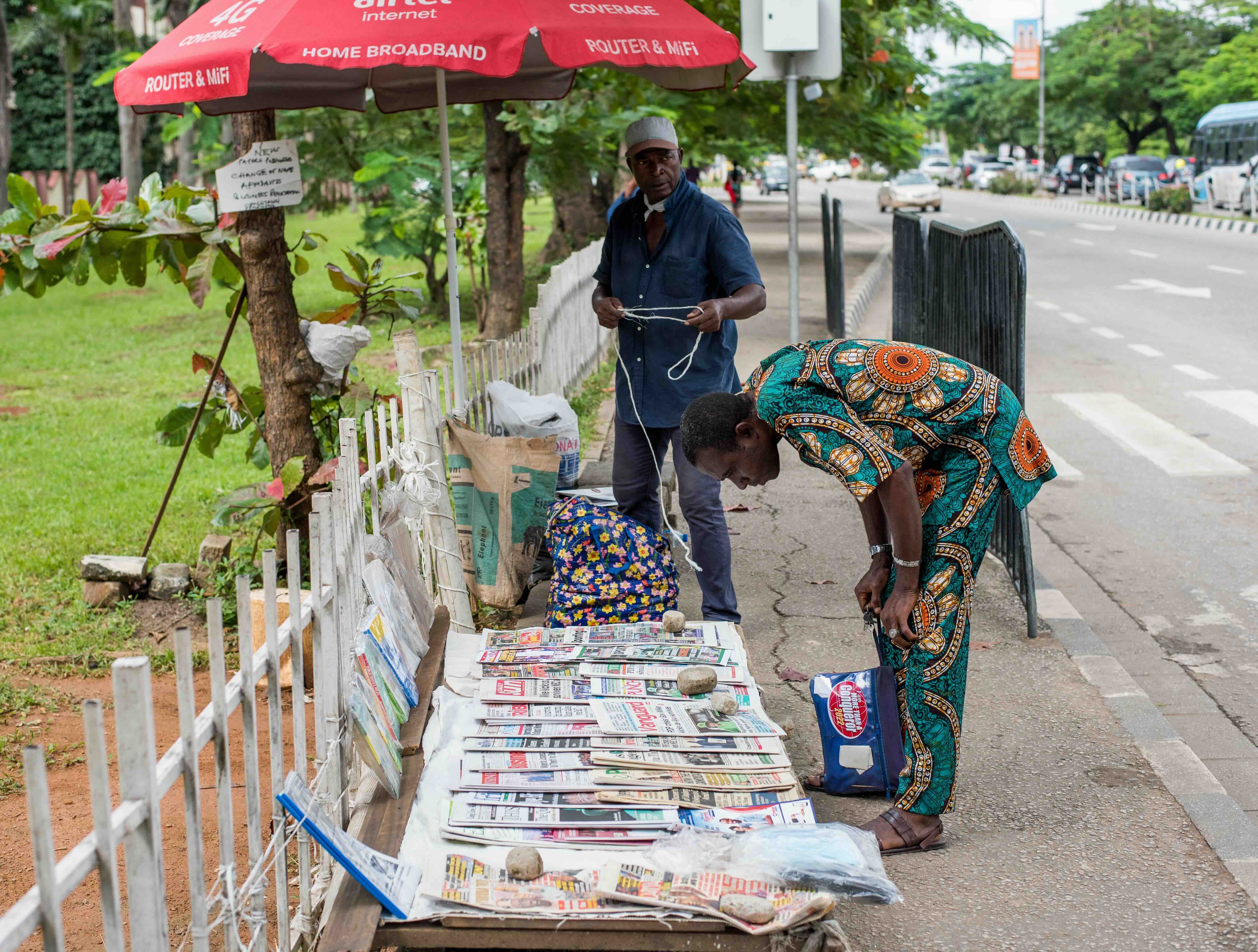
A man reads a newspaper with the news
© ShutterstockThe Friedrich Naumann Foundation for Freedom (FNF) Sub-Saharan Africa, in collaboration with the German Embassy in Sierra Leone, recently organised a roundtable discussion titled "Strengthening Human Rights Reporting in Sierra Leone." This event, held alongside the recording of content for the popular Let’s Talk Human Rights podcast on transitional and restorative justice in post-conflict countries, brought together key stakeholders in journalism and government to address the challenges and opportunities in human rights reporting.
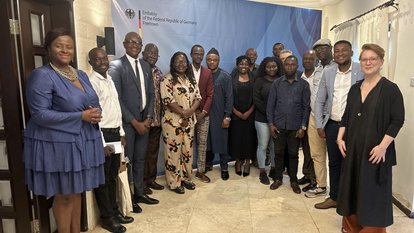
Those in attendance at the journalism and human rights reporting roundtable include renowned journalists, government representatives, and international figures
© Friedrich Naumann Foundation for Freedom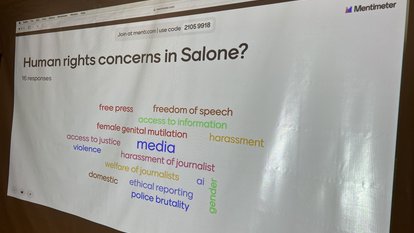
Journalists in attendance list what they believe are some of the human rights challenges in Sierra Leone
© Friedrich Naumann Foundation for Freedom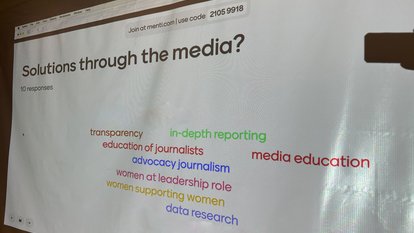
Journalists in attendance list what they believe are some of the solutions to human rights challenges in Sierra Leone that could be offered by the media
© Friedrich Naumann Foundation for Freedom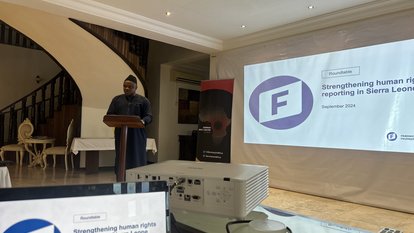
H.E. Bockarie Abdel Aziz Bawoh, Deputy Minister of Information and Civic Education in Sierra Leone
© Friedrich Naumann Foundation for Freedom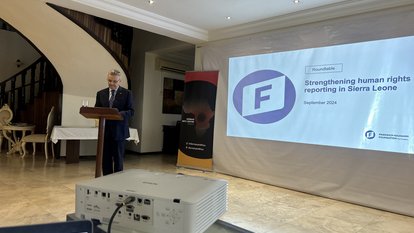
H.E. Jens Kraus-Massé, the German Ambassador to Sierra Leone
© Friedrich Naumann Foundation for Freedom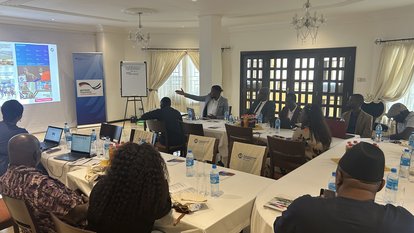
A presentation on FNF's human rights commitments in the region
© Friedrich Naumann Foundation for Freedom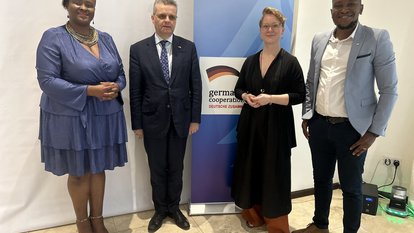
Masechaba Mdaka and Mthoba Chapi of the Friedrich Naumann Foundation for Freedom in Sub-Saharan Africa, along with H.E. Jens Kraus-Massé, the German Ambassador to Sierra Leone, and Sabine Yang-Schmidt of the German Embassy in Sierra Leone
© Friedrich Naumann Foundation for FreedomAmong those in attendance were renowned journalists, government representatives, and international figures, including:
1. Umaru Fofanah, Freelance Reporter for BBC and Reuters
2. Kelvin Lewis, Editor for *Awoko* Newspaper
3. Bockarie Abdel Aziz Bawoh, Deputy Minister of Information and Civic Education
4. Dr. Julius Spencer, Former Minister of Information and Broadcasting
5. Jens Krause-Massé, German Ambassador to Sierra Leone
A platform of reflection on human rights reporting in Sierra Leone
The event served as a platform for reflecting on the state of human rights journalism and fostering dialogue between media professionals and government bodies.
Jens Krause-Massé, the German Ambassador to Sierra Leone, emphasised the crucial role of political foundations and international organisations in promoting human rights. He highlighted how the German Embassy works closely with the Sierra Leonean government to bolster human rights initiatives. Krause-Massé stressed that fostering robust reporting mechanisms is vital to ensuring that human rights violations are not left unreported. He also noted that, despite the global nature of human rights concerns, collaboration between nations can prevent all parties from becoming victims of human rights abuses.
Bockarie Abdel Aziz Bawoh, Sierra Leone’s Deputy Minister of Information and Civic Education, underscored the importance of President Julius Maada Bio’s repeal of the seditious libel clause in the Public Order Act of 1965, a move aimed at enhancing press freedom. He commended the President for creating an environment where journalists can report freely and independently, thereby promoting transparency and accountability.
However, the Minister acknowledged the challenges journalists face, particularly in adapting to new technologies due to limited resources. He noted that poverty in the media sector hinders the ability of journalists to effectively report on human rights violations. Furthermore, while traditional media outlets are regulated, social media remains largely uncontrolled, raising concerns about misinformation.
The Minister also called on the Sierra Leone Association of Journalists to take its responsibilities seriously, emphasising that the Ministry is taking affirmative actions to support their work. He reiterated that any form of interference in journalists' work is unjustified, while cautioning that journalism should not endanger national sovereignty. He concluded by highlighting the need for enhanced training facilities to equip journalists with the necessary skills for comprehensive human rights reporting.
FNF's commitment to human rights
Mthoba Chapi of the Friedrich Naumann Foundation (FNF) delivered a presentation on the institution’s ongoing work in the field of human rights. Chapi showcased FNF’s annual human rights reports and reiterated its commitment to supporting human rights defenders globally. FNF’s Human Rights Hub, based in Geneva, plays a crucial role in addressing these challenges, and the organisation continues to prioritise strengthening human rights reporting through training and support.
Human rights concerns in Sierra Leone
During the interactive session, participants discussed major human rights concerns in Sierra Leone, including domestic violence, female genital mutilation (FGM), and the impact of artificial intelligence on rights protection. Journalists voiced frustrations over issues with the police and judiciary when handling human rights cases, as well as the persistent challenge of inadequate communication structures within law enforcement.
The roundtable also touched on the growing problem of sensationalism in news reporting, which can detract from the seriousness of human rights violations. Participants agreed that independent reporting, supported by reliable data, is key to advancing human rights protections. Poverty in the media industry remains a critical obstacle, limiting the ability of journalists to adequately cover human rights violations.
In closing, German Ambassador Jens Krause-Massé stressed the importance of training Sierra Leonean journalists and media professionals in the use of modern technologies, such as print machinery, to enhance the quality and reach of their reporting. The roundtable provided a critical platform for fostering collaboration between the government, international organisations, and the media to strengthen human rights reporting in Sierra Leone.
